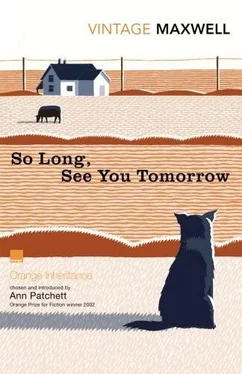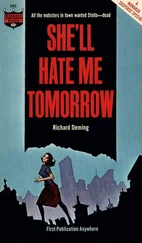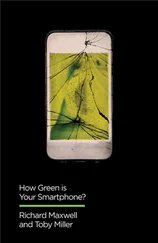My mother’s sisters and my father’s sisters and my grandmother all watched over us. If they hadn’t, I don’t know what would have become of us, in that sad house, where nothing ever changed, where life had come to a standstill. My father was all but undone by my mother’s death. In the evening after supper he walked the floor and I walked with him, with my arm around his waist. I was ten years old. He would walk from the living room into the front hall, then, turning, past the grandfather’s clock and on into the library, and from the library into the living room. Or he would walk from the library into the dining room and then into the living room by another doorway, and back to the front hall. Because he didn’t say anything, I didn’t either. I only tried to sense, as he was about to turn, which room he was going to next so we wouldn’t bump into each other. His eyes were focused on things not in those rooms, and his face was the color of ashes. From conversations that had taken place in front of me I knew he was tormented by the belief that he was responsible for what had happened. If he had only taken this or that precaution… It wasn’t true, any of it. At a time when the epidemic was raging and people were told to avoid crowds, he and my mother got on a crowded train in order to go to Bloomington, thirty miles away, where the hospital facilities were better than in Lincoln. But even if she had had the baby at home, she still would have caught the flu. My older brother or my father or I would have given it to her. We all came down with it.
I had to guess what my older brother was thinking. It was not something he cared to share with me. I studied the look in his hazel eyes and was startled: If I hadn’t known, I would have thought that he’d had his feelings hurt by something he was too proud to talk about. It was the most he could manage in concealment. At night we undressed and got into bed and fell asleep without taking advantage of the dark to unburden our hearts to each other. It strikes me as strange now. It didn’t then. Though we were very different, he knew me inside out- that is to say, he knew my weaknesses and how to play on them, and this had made me leery about exposing my feelings to him. I also suspect that I had told on him once too often. I have no way of knowing what he might have said. What I didn’t say, across the few feet that separated our two beds, was that I couldn’t understand how it had happened to us. It seemed like a mistake. And mistakes ought to be rectified, only this one couldn’t be. Between the way things used to be and the way they were now was a void that couldn’t be crossed. I had to find an explanation other than the real one, which was that we were no more immune to misfortune than anybody else, and the idea that kept recurring to me, perhaps because of that pacing the floor with my father, was that I had inadvertently walked through a door that I shouldn’t have gone through and couldn’t get back to the place I hadn’t meant to leave. Actually, it was the other way round: I hadn’t gone anywhere and nothing was changed, so far as the roof over our heads was concerned, it was just that she was in the cemetery.
When I got home from school I did what I had always done, which was to read, curled up in the window seat in the library, or lying flat on my back on the floor with my feet in a chair, in the darkest corner I could find. The house was full of places to read that fitted me like a glove, and I read the same books over and over. Children tend to derive comfort and support from the totally familiar — an umbrella stand, a glass ashtray backed with brightly colored cigar bands, the fire tongs, anything. With the help of these and other commonplace objects — with the help also of the two big elm trees that shaded the house from the heat of the sun, and the trumpet vine by the back door, and the white lilac bush by the dining room window, and the comfortable wicker porch furniture and the porch swing that contributed its creak . . creak . . to the sounds of the summer night — I got from one day to the next.
My father got from one day to the next by attending faithfully to his job. He was the state agent for a small fire insurance company and traveled from one end of Illinois to the other, inspecting risks and cultivating the friendship of local agents so they would give more business to his company. On Saturday morning, sitting in the library, he would put a check on each inspection slip as he finished glancing over it, and when he had a pile of them he would hand them to me and I would sit on the floor and arrange them around me alphabetically, by towns, proud that I could be of use to him. He left on Tuesday morning, carrying a grip that was heavy with printed forms, and came home Friday afternoon to a household that was seething with problems he was not accustomed to dealing with. His sadness was of the kind that is patient and without hope. He continued to sleep in the bed he and my mother had shared, and tried to act in a way she would have wanted him to, and I suspect that as time passed he was less and less sure what that was. He gave away her jewelry, and more important to me, her clothes, so I could no longer open her closet door and look at them.
I overheard one family friend after another assuring him that there was no cure but time, and though he said, “Yes, I know,” I could tell he didn’t believe them. Once a week he would wind all the clocks in the house, beginning with the grandfather’s clock in the front hall. Their minute and hour hands went round dependably and the light outside corroborated what they said: it was breakfast time, it was late afternoon, it was night, with the darkness pressing against the windowpanes. What the family friends said is true. For some people. For others the hands of the clock can go round till kingdom come and not cure anything. I don’t know by what means my father came to terms with his grief. All I know is that it was more than a year before the color came back into his face and he could smile when somebody said something funny.
When people spoke about my mother it was always in generalities — her wonderful qualities, her gift for making those around her happy, and so on — that didn’t tell me anything I didn’t know before. It was as if they couldn’t see her clearly for what had happened to her. And to us. She didn’t like having her picture taken and all we had was a few snapshots and one formal photograph, taken when she was in her early twenties, with her hair piled on top of her head and a black velvet ribbon around her throat. She was only thirty-eight when she died, but she had grown heavy, as women of that period tended to do. There was no question about the mouth or the soft brown eyes. The rest I did not recognize, though I was willing to believe that she had once looked like that. This picture didn’t satisfy my father either, and he got the photographer who had taken it to touch it up so she would look more like a mature woman. The result was something I was quite sure my mother had never looked like — vague and idealized and as if she might not even remember who we were. My mother sometimes got excited and flew off the handle, but not this woman, who died before her time, leaving a grief-stricken husband and three motherless children. The retouched photograph came between me and the face I remembered, and it got harder and harder to recall my mother as she really was. After I couldn’t remember anymore except in a general way what she looked like, I could still remember the sound of her voice, and I clung to that. I also clung to the idea that if things remained exactly the way they were, if we were careful not to take a step in any direction from the place where we were now, we would somehow go back to the way it was before she died. I knew that this was not a rational belief, but the alternative — that when people die they are really gone and I would never see her again — was more than I could manage then or for a long time afterward.
Читать дальше












